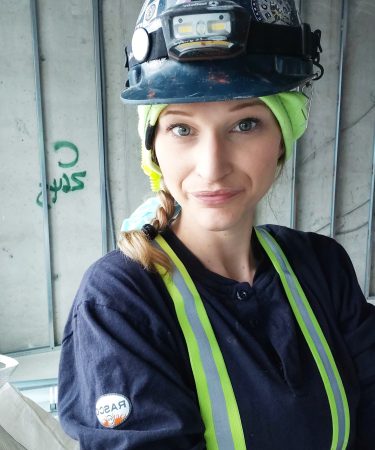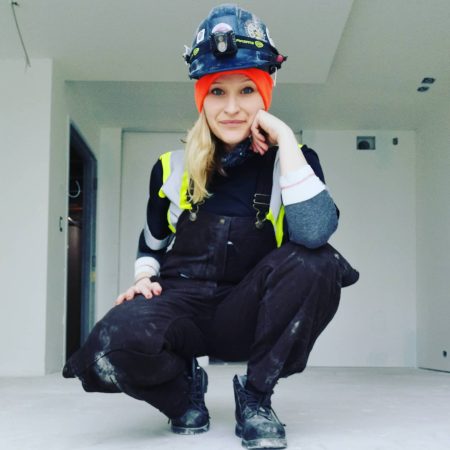
Working together, inspiring fellow women, crucial to success
Adam Dras
News News Women in Manufacturing ippt manufacturing processing womenShannon Tymosko is an electrical apprentice and a strong advocate for enabling women to enter and advance into the skilled trades sector and improving the mental health for those in that sector through her efforts as a motivational speaker and by hosting several workshops on this very subject.
A self-described “proud Sister of the IBEW Local 105,” she sat down with Don Horne of IPP/T magazine to discuss how she inspires women to enter the skilled trades and manufacturing sector.

Shannon Tymosko
“One of the big things I have learned from life is you never get a break from the demands of bills and most people live paycheque to paycheque, unprepared for any unexpected added expense,” says Tymosko. “Due to this I have learnt the importance of loving what you do, along with finding a job that can allow you to thrive not just survive on your own. I picked the skilled trades (electrical) because it was a job that I found to love and allowed me to have the potential to retire.
“It is because of all my experiences that I think it is so important you take time to try different things, research opportunities, get your hands dirty, and explore your passions, while being realistic knowing one day you will have to support yourself on your dreams.”
Inspiring women to enter the skilled trades and manufacturing sector
“Actions often speak louder than words and being a woman in skilled trades today means that I am still a minority, underestimated and a trailblazer for other women to follow,” she says. “It means I must be strong, self-aware, and realistic that I am still in a man’s world. I must be patient and not push change but be an ambassador and advocate for change. I must be persistent, work hard and show the young woman of tomorrow that they too can do whatever they desire. If you can see it, then it is easier to believe you can be it.”
Sadly, observes Tymosko, young people see more actors and actresses than woman as skilled trades workers.
“This could lead them to believe that being a movie star is a more realistic career choice than being a skilled trades worker; and we all know there are more construction workers that actors in the world,” she says.
COVID has put a crimp in mentorship programs, but Tymosko remains undeterred, having joined a mentorship program as a Mentee in search of inspiring tradeswomen.
“I entered the trades during COVID, and this has limited my networking and potential exposure to other woman, and opportunities,” she says.
Encouraging women to enter the manufacturing sector requires initiatives that “highlight women in authentic skilled trades roles who can help inspire young people.”
“If you can see it, it is easier to believe you can be it too,” she says. “Education is power and getting into the schools, educating young woman about their options, tearing down misperceptions that may keep them back will only give light to a whole new industry. There are also so many mentorship programs out there like LeadHerTrades, which is proving to be successful, increasing the retention rate and helping women everywhere.”
Deciding it was time for a change
It was back in 2017 at 29 years of age Tymosko realized she needed a change of job.
“I would come home stressed, did not feel a sense of pride about the work I was doing, and had to fight for 50 cent raises that did not reflect the increase in cost of living,” she says. “I enjoyed a few aspects of my job, like training and teaching, but overall, this was not a job that left me fulfilled or able to pay my bills very comfortably. I realized we spend more time at work than we do at home, and I believe it is so important to enjoy what you do. There is no perfect job, however one that makes you feel proud and happy, is a job that feels more like a hobby than a chore.”

Tymosko urges women to join the skilled trades sector, as it offers so many opportunities and financial security.
Additional to mental health and happiness is financial security, she points out, and as she sunk deeper into debt year after year, she knew a change was needed.
“It was during this time that my best friend Matt purchased a house and started home renovations. Together we tore apart and rebuilt a kitchen, two bathrooms and finished a basement that required framing, drywall, mudding, electrical and finishing touches. It was the hours I spent working on this home that ignited my passion for working with my hands. It was the beginning of my new journey,” says Tymosko.
The rewards of working in skilled trades
“I genuinely love my job, and being an electrical apprentice keeps my physically, and mentally healthy, all while helping me stay financially secure. I feel challenged, engaged, and proud of the work I do,” she says. “There is an amazing sense of pride and accomplishment you get when you finish a project and can say; I built that.
“I am not afraid to pick up a new tool and try something different, and this has helped increased my self confidence and self-esteem. No two projects are 100 per cent alike in the trades and inevitably I learn something new almost every day I go to work. Because of this I have developed the courage to try new things, fall, stand back up, and repeat until success; nothing feels better than being able to say, I helped build that!”
Machinist training was invaluable
“My time spent as a child and youth worker provided me with the knowledge and know how, to find programs and resources available to help women get into the trades; however, this was still a big challenge,” she says. “I started researching and found a free government-funded pre-apprenticeship program offered though the YWCA Hamilton for machining and applied.”
At the time, Tymosko didn’t know what a machinist was, “but I knew any education and resume building experience would be a benefit. I was accepted into the program in 2018 and successfully completed it along with a six-month co-op at Arcelor Mittal Dofasco in 2019.”
She enjoyed machining, and after her co-op finished, Tymosko began her job and employer sponsorship search.
And that search included downplaying the fact she was a woman.
“The next several months I applied for every possible machinist position available, on all job platforms, and removed and changed content on my resume to appear less female and continued to find myself jobless,” she says. “However, I do understand some of the challenges that machine shops may encounter when hiring a woman. The changes they may have to make to accommodate a woman (such as a washroom) could be costly, particularly for small shops. I believe this to be a common struggle for anyone trying to get into skilled trades, as employers are hesitant to take on ‘green’ people.”
Obstacles for women remain
“There are a ton of different obstacles for woman, but sisterhood – or lack of sisterhood – is currently my biggest frustration,” she says. “First, I’d like to say I have met some amazing women who work in the industry and are nothing but incredible, supportive, and encouraging; we need more of these women! However, I spent several months on my previous job site walking around on eggshells due to one woman on the construction site.”
The woman was the health and safety person for the site and “made it her personal business to go out of her way to give me a safety talk about something she felt I was doing wrong,” says Tymosko. “Now I normally would encourage these conversations as safety should be everyone’s number one concern, but it should also be consistent! It was extremely frustrating watching this woman pick and choose who she would have safety conversations with.”
On top of this worksite headache, Tymosko wonders why she keeps finding women competing with each other.
“There is so much room for us all! And what is so confusing to me is, aren’t most of us advocating for more women to be in the skilled trades?” she says. “Please try to remember you are not going to like everyone, that is okay! But talking about other women behind their backs or slandering her perception to people who haven’t had a chance to build their own, or even worse lying about a fellow sister is extremely unprofessional and immature. We should be building our sisters up, sharing their stories, encouraging them to be unique and different.
“A good sister, and mentor knows she cannot reach everyone and needs the help of her sisters to reach the ones she cannot. Sisters everywhere you are likely to build a friendship at some point in your career where they surpass you, and maybe even with your help. Remember, their success is your success and ultimately helping everyone’s goal of getting more woman in the skilled trades,” says Tymosko.
Why companies and government need to grow apprenticeships
“The apprenticeship process is unique and amazing experience where you learn your trade on the job, not solely in books. This kind of industry requires real hands out experience to know what you are doing, and this must be passed down from the Journeyman to the apprentice. What I believe to be a crucial flaw of employers is the lack to want to take on new or ‘green’ hires,” she says. “What is going to happen is we are going to lose a ton of not just labour through retirement, but knowledge. This knowledge cannot all be learned in a book and some of it is old technology and no longer even covered in schools.
“I believe the government is taking the measure to invest in programs, training and organizations knowing the importance of bringing more people into the industry, but if we do not have employers willing to take on new hires we remain in the same boat.”
Print this page
Advertisement
Stories continue below
Related